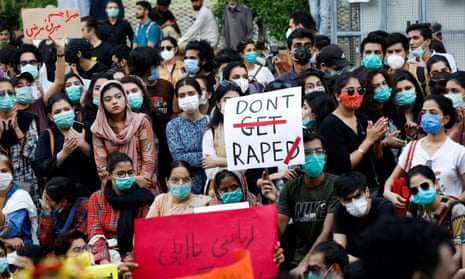Pakistan’s president has approved a tough new anti-rape law that includes the establishment of special courts to speed up rape trials and the chemical castration of serial rapists.
The legislation, which must be approved by parliament to remain in effect, requires courts to conclude the trials of alleged rapists and issue verdicts within four months. It also prohibits the disclosure of the identity of rape victims and will create a national sex offenders’ register.
Rape crisis cells will also be established to ensure victims undergo a specialist medical examination within six hours of reporting the incident. Officers who are found to be negligent in investigating rape cases could face a three-year prison sentence.
The move follows outrage over the gang-rape of a woman in front of her children in September after her car broke down by the side of the road in Lahore. It prompted protests after the investigating police officer appeared to blame the victim for travelling alone.
Before the new law, rape cases could drag on for years, mainly because of faulty investigations and flawed laws, making it difficult for victims to come forward to share their ordeal.
While rights groups celebrated the law, Amnesty International expressed concern at the inclusion of a chemical castration punishment for repeat rape offenders, a process that involves an injection to lower testosterone levels.
Rimmel Mohydin, south Asia campaigner at Amnesty International, accused the government of attempting to “deflect attention” from the root causes of sexual violence in Pakistan.
She said: “Forced chemical castrations would violate Pakistan’s international and constitutional obligations to prohibit torture and other cruel, inhuman or degrading treatment. Punishments like this will do nothing to fix a flawed criminal justice system.”
The new law comes months after the prime minister, Imran Khan, promised to remove deficiencies in existing legislation to expedite justice for rape victims. Khan and his cabinet approved the legislation last month, and the president signed it into law on Tuesday, bringing it into force.
The government now has 120 days to get the measure approved by parliament and have it permanently passed into law.
Nearly 1,000 women are killed in Pakistan each year in so-called “honour killings” for allegedly violating conservative norms on love and marriage.
Associated Press contributed to this report
